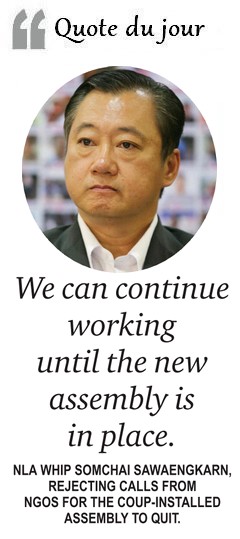
With less than a month to go before the general election, there are growing calls for the coup-installed National Legislative Assembly (NLA) to suspend its law-making duties and for its members to resign.
On Wednesday, about 300 representatives of non-government organisations, who donned black attire in a symbolic protest, turned up in Bangkok to demand the assembly members terminate their role immediately

Firstly, they pointed out that state budget would be saved if the assembly members quit.
They also said the NLA had issued more than 400 laws, with several of them problematic that they allege trespass on basic human rights.
Over the past month, the coup-installed body has come under criticism for proposing the contentious rice bill which would have given agro giants control of the market while compromising the diversity of rice strains.

Due to public anger, the NLA agreed to put the controversial bill on hold indefinitely. The assembly announced on Tuesday -- amid speculation that the military regime had forced the backtracking out of fear of losing popularity -- that it had suspended the readings and would leave it to elected lawmakers and an elected government to decide its fate.
Before this, the NLA approved a revised version of the industrial plants act, which enables certain types of factories to operate without registering for licences. The revised law, which was vetted when the country was combatting the PM2.5 dust crisis, caused concerns about the impact on the environment. It also significantly watered down some crucial legislation, including the Land and Property Act, which had been proposed with the noble goal of narrowing inequalities.
NLA president Pornpetch Wichitcholchai, who agreed to meet with representatives of the protesters on Wednesday, insisted the NLA could not resign as it is obliged to vet existing bills.
Earlier last month he said the NLA now aimed to pass about a hundred bills pending their second and third readings before the election. That means between 10 and 15 bills on average will have to be passed each week. The rush only intensifies public concerns.
Another key assembly figure, NLA whip Somchai Sawaengkarn, told the protesters the 2017 constitution allows the coup-installed NLA to work until the new assembly is in place but that law-vetting will continue until March 15. He added that there are about 20 bills currently being mulled by the assembly.
However, over the past four years, the 200-plus member NLA, due to its composition, which consists primarily of commissioned and retired military officers, police and civilians, has failed to live up to public expectations in fulfilling its role as a checks-and-balances mechanism. Critics see the assembly as simply the military regime's rubber stamp.
Now it has several contentious bills on its agenda. Among them are the cybersecurity bill and a bill on people's privacy protections that has been criticised for giving too much power to the state to spy on citizens. The bill is to be voted on Thursday after a fierce debate.
It would be wrong if the NLA continues to work on these contentious bills, especially ones that curb human rights. The NLA must leave those bills to the new parliament that will be in place in a few months' time, which has been given a mandate from the people.
